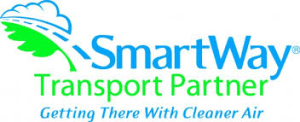In the last few weeks I’ve had the opportunity to speak to two of the three large shippers that were SmartWay Excellence awardees. I spoke to Ron Guzzi the Senior Manager of Transportation Carrier Relations and Sourcing at Home Depot. I also spoke to Blair Chikasuye, the Global Logistics Environment Manager at Hewlett-Packard (HP), about their transportation related sustainability initiatives.
The SmartWay Program is a voluntary collaboration between the U.S. Environmental Protection Agency (EPA), Natural Resources Canada, and the freight industry. It is intended to increase energy efficiency while trimming greenhouse gas emissions and air pollution.
Both Home Depot and HP have aggressive targets for reductions in greenhouse gases. Home Depot set a 20 percent reduction target for their domestic supply chain greenhouse gas emissions by 2015 (from 2008 levels).
HP has committed to reducing their first tier manufacturing and global product transportation-related GHG emissions intensity by 20% by 2020, compared to 2010. HP has made great strides in fulfilling this commitment and, as of December 2013, achieved a GHG emissions intensity reduction of 18% compared to 2010 levels.
At both companies, the transportation department has a role to play in helping their companies meet their overall corporate sustainability goals. Both Home Depot and HP are pushing to convert more shipments from truckload to intermodal. In Home Depot’s case, they are using a transportation management system (TMS) from Manhattan Associates to help facilitate this. HP is working with Menlo Worldwide Logistics as their managed transportation services provider. Menlo, in turn, utilizes their own homegrown TMS application.
Ron Guzzi from Home Depot leads a team of 10 people focused on getting carrier bids, writing the contracts, and making sure awarded contracts are adhered to. At Home Depot, carriers compete for business based upon cost, reliability, and sustainability. At Home Depot, Ron’s transportation team is influenced by the environmental team, “but we drive the procurement process.”
Ron made the point that every dollar of their North American transportation budget is spent on SmartWay certified carriers. Home Depot is one of the very few shippers that has gone beyond just having a preference for working with SmartWay carriers to giving preference to carriers that score in the top categories of SmartWay’s rankings. SmartWay carriers, in general, should be presumed to be causing fewer carbon emissions than carriers not certified. But SmartWay ranks carriers into five categories from the best in class, the top 20 percent of carriers in the program, down tier by tier to carriers that are still certified but not showing the same degree of excellence. Bids from Home Depot’s highest quintile of SmartWay carriers suffer no penalty. Bids from second quintile carriers have their rates on a particular lane inflated by one quarter of one percent; the third quintile has a lane penalty of one half a percent; the fourth quintile, three quarters of a percent; and the bottom category suffers a one percent inflation of their bid.
Blair Chikasuye from HP is part of the global transportation procurement team but has dotted line relationships to the global social and environmental responsibility team.
In 2008, HP was the first company to meet requirements from the EPA to have the agency’s SmartWay logo displayed on its consumer product packaging. Blair describes this as a “great partnership.” And the benefits are likely to increase in the next couple of years. In March, President Obama issued an executive order directing US federal agencies to set carbon reduction targets by at least 40 percent over the next decade. One part of the order mandates purchasing sustainable products and services identified by EPA programs including making use of SmartWay Transport partners. Out of the top 40 US government suppliers, HP is among only three that use SmartWay carriers for all domestic shipments.
But HP has a global supply chain, and SmartWay is just one piece of the puzzle to drive their end to end logistics sustainability efforts. In 2014, HP became one of the first companies to be awarded a “first leaf” by Green Freight Asia and Green Freight Europe for transparency of CO2e data and policies related to transportation GHG emissions. HP is also an active participant organizations such as the Global Logistics Emissions Council, the Clean Cargo Working Group (Ocean), and IATA (Air). These other organizations are necessary, because the carbon emissions from a truckload move in the US can’t be assumed to be the same as the same type of move in Thailand. Unfortunately, none of the other sustainability organizations have made as much progress as SmartWay.
In the U.S., HP, like Home Depot, is incentivizing carriers to improve their emissions performance by partnering with carriers to implement natural gas trucks at their West Coast distribution center and developing shared freight arrangements.
On the global front, HP is actively exploring new lanes and gateways to drive lower greenhouse gas emissions. They have helped establish a new freight train network from Chongqing to Germany, along the Trans-Eurasian Railway, which enables the shipment of products at a fraction of the carbon impact of air freight and investigated alternative ports to decrease shipping distances, including use of the port of Piraeus in Greece, and expanded use of the Panama Canal.
The pressure to be a sustainable company is only going to grow. Home Depot and Hewlett-Packard are currently at the front of the pack when it comes to excellence in transportation sustainability.

















